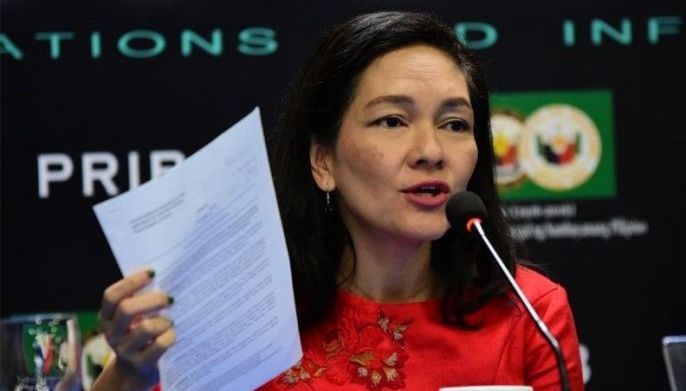'Anu na, 2020 na': Psychologists give tips in tackling mental health on social media

MANILA, Philippines — In a recent Instagram post, it can be recalled that singer-actress Nadine Lustre said that it is “never okay to use someone’s mental situation/tragic past just to prove a point. Mental illness is a very sensitive matter."
Nadine ended her post by saying, “Anu na, 2020 na!"
Related: '2020 Na': Hontiveros urges sensitivity on mental health from 'media, persons of influence'
Even before Nadine posted about mental health, Filipino psychologists reminded the media to follow World Health Organization (WHO) guidelines in reporting about mental health issues. These include avoiding language that sensationalizes or normalizes suicide; showing due consideration for people bereaved by such act; and taking particular care in reporting celebrity deaths.
“We all know that when a suicide happens and there’s news about it, there’s something like a wonder effect. ‘Yun bang kapag may celebrity news about suicide, may mga copycat na nangyayari. That’s the sad part. But the role of media is very critical, very great,” Dr. Eleanor Lacuna-Ronquillo, co-author of the Mental Health Law, told the media during the recent “Break the Stigma” press conference organized by Pfizer and Upjohn.
“So, it’s very important for media to have the guidelines on how to deal with a suicide. DOH (Department of Health) will also develop a national suicide prevention strategy, pero your role here is responsible media reporting and handling of suicide events. Ang sabi (ng DOH), it’s better to highlight the person and the good things that the person did but not highlight the suicide. So guidelines ang kailangan.”
Drop ‘krung-krung’
Sooner or later, Korean pop star Sandara Park may have to change her Philippine moniker “Ang Pambansang Krung Krung” as making fun of mental health-related terms such as “krung krung” (a Tagalog colloquial term for “crazy”) will not help in breaking the stigma against mental health issues like depression, the psychologists reminded.
Last year, the K-pop world was rocked by the death of stars like Goo Hara, Sulli and Joen Mi-seon.
“People associate mental health to disorders and weakness — may toyo, krung-krung — but this is only a small portion of mental health because a big portion talks about resilience, strength, wellness, pero na-notice ko sa media and social media masyado tayong na-focus sa negative aspects. I think it’s also high time to talk about the other side para mas mareduce pa ‘yung stigma,” said psychologist Rian Portuges of #MentalHealthPH.
#MentalHealthPH is an advocacy group that envisions a mentally healthy community and aims to promote and protect mental health using social media and digital technologies, with the goal to engage the community in promoting and protecting mental health, end the stigma through education, and improve access to mental healthcare, services and information.
“Usually, social media’s part in mental health is neglected. But based on research, the more you talk about mental health, the more that suicide rates lessen because awareness is raised. ‘Pag nagre-raise ng awareness, nagkakaro’n ng intervention para dun sa suicide,” Portuges explained.
“People are usually afraid to talk about mental health because it was misconceived as a weakness in character, which is wrong because actually, it’s a sign of being courageous.”
Tips for celebrities
Apart from the media, Portuges also reminded celebrities to follow WHO’s mental health guidelines in their social media posts.
“May mga post naman sa WHO kung papano s’ya dapat sinasabi sa social media. So ‘yun, gawin sana nating less toxic ang social media,” said Portuges, who has provided counseling for celebrities who got bashed.
The psychologist also shared pieces of advice on how stars should safeguard their sanity amid trolls and bashers.
First, remember that positive and negative feedback is part of being famous.
“‘Pag celebrity ka, ‘di ba malaki ang ‘yong reach? So maraming nagmamahal at marami rami ding naiinis. Always remember na ‘pag sikat ka, part din na may negative ka na ma-e-encounter kasi maaring form of inggit, ‘di ba? Or hate,” Portuges suggested.
Second, a celebrity should isolate oneself from the bashing and think that it may be coming from a basher’s personal problem.
“Ang kailangan gawin ng celebrity, they need to isolate themselves sa situation. Minsan hindi talaga sila ‘yung problema. Ang ibang tao ang may problema sa kanila, so kapag na-differentiate mo ‘yung sarili mo sa situation, siguro malaking tulong ‘yan para makapag-cope ka rin,” Portuges recommended.
“Isipin mo din na maaring walang problema sa’yo, maaaring problema talaga ‘yun ng tao na ‘yun na na-proproject sa’yo kasi maaaring naiinggit sa’yo o talagang ‘yun ‘yung way n’ya, may problema s’ya sa’yo. The best talaga i-isolate mo ‘yung sarili mo sa situation kasi kahit anong gawin mong maganda, laging may negative eh… May mga tao talaga na hahanapan at hahanapan ka ng butas.”
Third, instead of being hurt, a celebrity could view the comments as constructive criticism of what one needs to improve on.
“Maganda rin, kunwari mayroon silang nareceive na bash, hindi rin maganda na lagi na lang nila iisipin na walang problema sa kanila. Minsan another way rin ‘yun para maging self-aware ka… Bakit kaya n’ya ‘yun nasabi? So mag-aask ka rin ng question, ano kaya ‘yung pinagmulan nun? Sa pinagmulan nun, d’un mo makikita kung ikaw ba talaga ‘yung may issue o s’ya yung may issue. So kailangan mo ma-distinguish ‘yun. Pero kailangan mo rin magreflect kasi baka may problem din sa’yo talaga na kailangan mo rin i-improve.”
Finally, celebrities are advised to seek support from genuine friends and loved ones.
“It’s also good to see the positive side also. Hindi naman lahat puro negative and bashing meron sila, right? Meron din naming positive side. And the social support they have that could really help with those kinds of responses,” said psychologist Janna Mae Pulido of #MentalHealthPH.
Tips for fans
Fans might see their idols as perched in a pedestal, but Portuges reminds fans that celebrities are also like anyone else who might be dealing with mental health issues, so fans should also be sensitive to their idols’ feelings.
“Let’s use our social media wisely. As much as possible, i-educate natin sa pagpopost ng status natin because there are times na nakak-trigger ‘yung mga post natin… ‘Yung words na nilalagay natin can also trigger ‘yung may mga mental health problems,” the psychologist reminded.
Should fans notice something suspicious about a celebrity’s status, Portuges urged fans to report such status to Twitter or Facebook.
“If ever may naka-encounter sa inyo ng post na connected sa suicide or harm, sa Twitter or Facebook, you can report that,” she said.
According to her, #MentalHealthPH collaborated with Twitter Philippines and Twitter is generating a software to detect posts and a pop message that could read “Do you need help?” and will refer one to different organizations that could help.
“Facebook already has a notification — you can report a friend anonymously to alert the public,” added Dr. Gia Sison, another psychologist.
If you or someone you know needs assistance, contact the National Center for Mental Health Crisis Hotline at +63 917 899 8727 and 7989 8727.



















